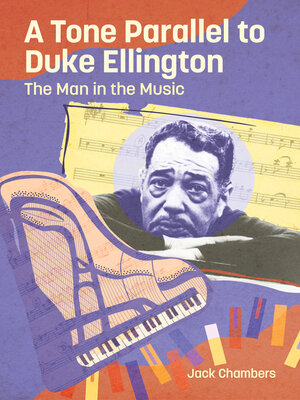A Tone Parallel to Duke Ellington
ebook ∣ The Man in the Music · American Made Music
By Jack Chambers

Sign up to save your library
With an OverDrive account, you can save your favorite libraries for at-a-glance information about availability. Find out more about OverDrive accounts.
Find this title in Libby, the library reading app by OverDrive.



Search for a digital library with this title
Title found at these libraries:
| Library Name | Distance |
|---|---|
| Loading... |
In this insightful new volume, Jack Chambers explores Edward Kennedy "Duke" Ellington's music thematically, collating motifs, memes, and predilections that caught Ellington's attention and inspired his restless muse. In presenting Ellington's work in this manner, Chambers situates the music in the context in which it was created—historical, political, musical, biographic, and personal. Chambers offers a novel kind of access to the man and the music.
Ellington's music presents a daunting task for listeners because of its sheer volume. The numbers defy credulity. Ellington (1899–1974) wrote more than two thousand compositions in numerous genres, including pop songs, big band swing, revues, hymns, tone poems, soundtracks, suites, ballets, concertos, and symphonies. Where to start? The themes in this book offer natural entry points. They provide the context in which the music came into being, with enough biography to satisfy music lovers, even those who come to the book knowing very little about Ellington's life. Each chapter features its own playlist as a guide to the music discussed, and, in some cases, fuller listings in case readers might want to pursue a topic further. In the early chapters, Chambers covers topics that occupied Ellington through much of his career, and in later chapters he covers more specific themes, some of them from Ellington's last decades, which are less well studied. The music, Ellington said, is his "continuing autobiography," and it reveals the man behind it.
Ellington's music presents a daunting task for listeners because of its sheer volume. The numbers defy credulity. Ellington (1899–1974) wrote more than two thousand compositions in numerous genres, including pop songs, big band swing, revues, hymns, tone poems, soundtracks, suites, ballets, concertos, and symphonies. Where to start? The themes in this book offer natural entry points. They provide the context in which the music came into being, with enough biography to satisfy music lovers, even those who come to the book knowing very little about Ellington's life. Each chapter features its own playlist as a guide to the music discussed, and, in some cases, fuller listings in case readers might want to pursue a topic further. In the early chapters, Chambers covers topics that occupied Ellington through much of his career, and in later chapters he covers more specific themes, some of them from Ellington's last decades, which are less well studied. The music, Ellington said, is his "continuing autobiography," and it reveals the man behind it.







